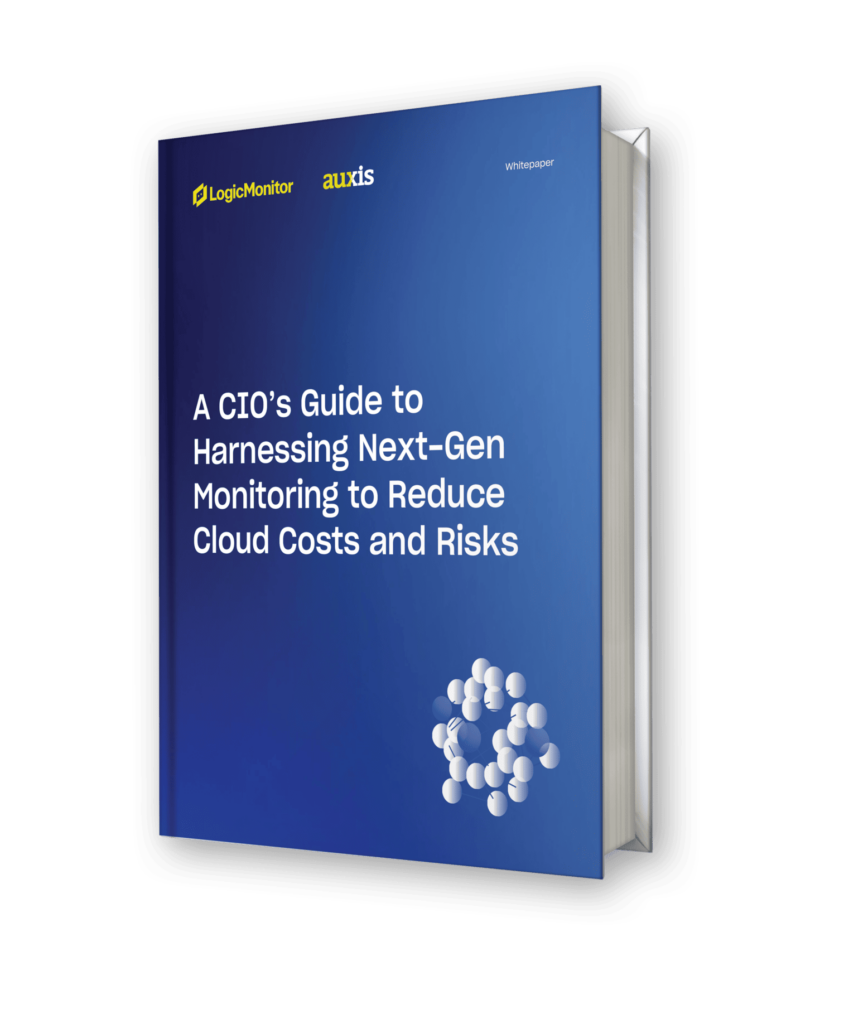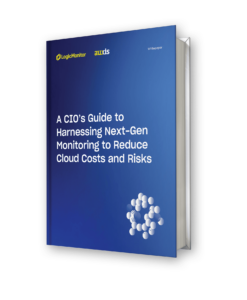In brief:
- Traditional infrastructure monitoring is device-centric – requiring as many as 30 different tools to monitor today’s complex IT environments.
- That fragmented approach creates high costs and siloed visibility that magnifies the risk of business-impacting outages, undetected security threats, and customer data loss.
- Next-gen observability tools combine a unified view, automation, and AI-powered insights to ensure mission-critical performance and availability across your entire tech environment.
- Partnering with an MSP using the LogicMonitor infrastructure monitoring platform delivers these benefits and more, providing 24/7 visibility, cost savings, and access to top-notch engineers to support “always on” tech.
Network-related issues are the #1 cause for IT service disruptions, according to a 2024 outage analysis by the Uptime Institute. But ensuring network reliability – while also tracking cloud services, security systems, databases, virtual machines, and more – is no easy task across today’s complex, hybrid technology environments.
Future-proofing your business by choosing a managed services partner (MSP) with a next-gen infrastructure monitoring tool is key to keeping pace with the speed, flexibility, and scalability of modern IT needs – delivering a unified view of all your infrastructure that ensures mission-critical performance and availability.
Next-gen monitoring tools collect, centralize, and analyze data from IT infrastructure, systems, and processes to inform and optimize management of your entire tech environment – proactively addressing issues before they become business-impacting events. By moving beyond traditional, outdated, device-centric monitoring, businesses gain end-to-end visibility and intelligence that covers on-premises and cloud native environments.
And bonus: Wrapping a comprehensive experience into a single AI-powered solution significantly lowers costs compared to deploying multiple monitoring tools.
Gartner expects 30% of organizations to adopt next-gen observability solutions by the end of 2024, up from less than 10% in 2020.
In this blog, we offer our perspective on why the next-gen LogicMonitor tool stands out as today’s go-to solution for fully automated, AI-powered infrastructure monitoring and observability. We will also show why partnering with an MSP Network Operations Center (NOC) that has implemented LogicMonitor’s comprehensive platform delivers the best ability to effectively manage, monitor, and optimize your network and entire IT environment.
A CIO’s Guide to Harnessing Next-Gen Monitoring to Reduce Cloud Costs and Risks

Tool sprawl increases pain points, reduces efficiency
Traditionally, troubleshooting networks and other IT infrastructure involved hands-on work and physical, on-premises equipment. But the advent of cloud computing increased infrastructure complexity and interconnectivity dramatically – making it harder for IT to monitor health and performance data, track end-user transactions, mitigate vulnerabilities and back doors, and pinpoint the root cause of issues or bandwidth slows.
Unfortunately, such low infrastructure visibility puts organizations at great risk of business-impacting outages and slowdowns, customer data loss, and undetected security threats. More than 90% of businesses now estimate that an hour of IT downtime costs more than $300,000 – and 44% say it exceeds $1 million.
That encompasses recovery costs, productivity and revenue losses, and intangible hits like customer goodwill and delayed projects.
Overly complex, linked systems also make it easier for malicious actors to infiltrate sensitive networks without detection. The global average cost of a data breach rose to $4.88 million in 2024—a 10% jump from 2023 and the highest total ever, according to IBM’s Cost of a Data Breach Report 2024.
To combat these problems, nearly 40% of businesses use 11-30 different IT infrastructure monitoring tools to watch their applications, infrastructure, and cloud environments, states a recent Sumo Logic report. Unfortunately, this fragmented monitoring approach creates many pain points, including:
- Limited visibility: Siloed data from multiple tools makes it impossible to see the big picture of your IT health, hindering performance optimization.
- Alert overload: Data silos and “alert storms” where different systems generate alerts for the same issue overwhelm IT teams, hindering them from pinpointing and resolving critical problems quickly. This fragmented view also hampers collaboration, leading to wasted time and effort.
- Rising costs: Managing multiple infrastructure monitoring tools requires higher spending for licenses, contracts, and training.
- Scalability challenges: As a business grows, scaling up a fragmented approach becomes increasingly complex and resource-intensive.
Even many MSPs suffer from tool sprawl, deploying an average of 10 MSP monitoring tools to support clients.
Monitoring infrastructure in-house also brings challenges
Consolidating your performance management strategy for networks, cloud, and other infrastructure into a single, comprehensive tool like LogicMonitor can significantly lower costs, increase productivity, and improve the context of visibility into your environment. However, most organizations face multiple challenges when implementing and operating next-gen monitoring tools in-house, such as:
- 24/7 monitoring difficulties: IT usually works during business hours. However, failing to monitor infrastructure alerts 24/7 can delay response and enable issues to slip through the cracks – leading to bigger problems.
- High starting cost: Implementing a next-gen tool requires a pricey upfront investment, which can make it inaccessible for some businesses.
- Configuration and support: Next-gen tools aren’t easy to configure and support – and the severe IT labor shortage makes it difficult and expensive to find resources with the right skill sets and expertise.
- Inefficient allocation of IT staff: Infrastructure performance monitoring tasks are tedious, distracting high-value IT staff from more important activities.
For businesses with sprawling networks, achieving the uptime they need hinges on comprehensive observability. Partnering with a managed services provider that’s already implemented LogicMonitor negates these issues, providing instant access to best-in-class processes, automated alerts, 24/7 capabilities, and top-notch engineers that are rarely available in-house.
Partnering with a nearshore IT provider delivers further benefits, providing real-time communication and in-sync time zones essential to solving urgent IT issues effectively. IT leaders ranked physical proximity as the #1 factor for choosing an outsourcing provider on Computer Economics’ 2023 IT Outsourcing Statistics report.
Outsourcing infrastructure management also reduces the hefty expense of next-gen monitoring tools, with MSPs being able to spread costs across multiple clients while maintaining data and access multi-tenancy.
LogicMonitor: Our choice for the best next-gen infrastructure monitoring tool on the market
LogicMonitor’s popularity is easy to measure, with accolades including Easiest to Use, Momentum Leader, and Best Results on G2’s 2024 rankings, as well as recognition as a top-rated platform by TrustRadius.
LogicMonitor’s innovative technology also earned it recognition as a Visionary on Gartner’s 2024 Magic Quadrant for Observability Platforms. Additionally, the CTO Club ranked LogicMonitor on its 12 best IT infrastructure software shortlist for 2024.
But with numerous platforms fighting for market space, what are the biggest benefits of choosing MSP infrastructure management with LogicMonitor?
1. Comprehensive solution for full infrastructure visibility at a reduced cost
In today’s complex and distributed IT landscape, LogicMonitor delivers unified visibility into infrastructure, logs, and applications within a single platform. Secure, cloud-based agentless monitoring goes beyond data to deliver actionable insights for your entire tech stack, including automated alert thresholds, AI-powered early warning capabilities, customizable escalation chains, workflows, and more.
The tool boasts a 99.9% SLA for platform availability, ensuring efficient data handling and robust performance through real-time insights, automatic load balancing, and failover support.
2. Automated deployment and configuration for the technology you rely on
LogicMonitor offers automated deployment and configuration for 3,000+ technologies – enabling organizations to integrate instantly with the network devices, technologies, and services they rely on, no matter how complex. The agentless platform intelligently detects what to monitor in customer environments and auto-configures a solution based on best practices.
This minimizes operational disruptions, gets customers up and running faster, and enables MSP infrastructure monitoring services to focus on key protections instead of tedious configurations.
3. AI-powered automation capabilities take monitoring to the next level
The release of Edwin AI pushed LogicMonitor to the forefront of the monitoring market. An AIOps solution touted as a “super-intelligent ITOps teammate,” Edwin AI leverages the power of machine learning and Generative AI to anticipate IT problems before they arise, streamline incident management, and provide enterprise-grade security with crystal-clear insights into your IT landscape.
If issues do occur, Edwin AI groups hundreds of alerts into a single, clear episode – relieving MSP teams of alert fatigue while ensuring critical issues don’t slip through the cracks. Proactive insights and automated actions further enable Edwin AI to anticipate and resolve issues before they escalate, ensuring continuous business operations.
As your infrastructure rapidly scales to accommodate changing workloads, LogicMonitor’s sophisticated AI alerts can distinguish abnormal deviations from normal fluctuations as well, delivering a flawless end-user experience.
Full observability combines with other AI-integrated features like intelligent data forecasting, flexible reporting, and custom dashboards to deliver actionable insights based on trusted data – helping to correlate events and pinpoint the root cause of complex problems faster and more efficiently. By shifting low-level decision-making activities like troubleshooting or capacity planning from engineers to the intelligent LogicMonitor tool, the next-gen monitoring system lets high-value human resources stay focused on the most important work for your business.
4. Multi-tenancy views without compromising data
LogicMonitor’s multi-tenancy views and customizable dashboards allow MSP infrastructure monitoring services to view all customer data on a single screen while ensuring it remains invisible to other clients. Without having to toggle between screens to view data for different organizations, MSP monitoring can provide true 24/7 visibility – ensuring nothing is missed.
5. AI helps optimize cloud infrastructure costs
Quality MSPs can utilize LogicMonitor to extend beyond cloud monitoring and optimize your cloud spend. The platform’s new LM Cost Optimization feature uses AI to consolidate billing data from multiple providers into a single view, providing actionable, intelligent insights with pre-built dashboards and filtered tags.
With effective cloud infrastructure cost management an ongoing pain point for enterprises, this data enhances MSPs’ ability to recommend cost-saving actions like optimizing resource utilization or suggesting capacity changes that align with business needs – helping you boost performance and cloud investment value.
Why Auxis: Next-gen capabilities and the right expertise to future-proof your business
As organizations fast-track digital transformations with new avenues for network access and use, migrate more data to the cloud, and scramble to shore up exploding cyber-risks, infrastructure challenges and complexity are spiraling.
Legacy tools lack the visibility needed for proactive monitoring and management. Partnering with a reputable provider like Auxis who takes full advantage of modern infrastructure management for MSPs delivers a future-proof solution that scales with your rapidly changing environment.
With cost-effective, top-tier nearshore IT talent focused on providing seamless performance and “always on” infrastructure, partnering with Auxis elevates your MSP solution from a mere source of technical support to a true strategic advisory partner.
Want to learn more about how IT infrastructure monitoring solutions can benefit your organization? Schedule a consultation with our IT infrastructure monitoring experts today! You can also visit our resource center for more IT outsourcing tips, strategies, and success stories.




